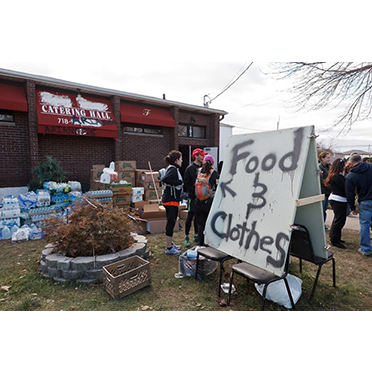Philanthropy Funding Overview
About charity, philanthropy, and mutual aid
Given that the government funding is often insufficient to address disaster needs fully, there is always an outstanding need for assistance, especially in frontline communities. Charity, philanthropy, and mutual aid play a big role in filling in the gaps.
- Charity is typically short-term giving that responds to an immediate need, such as providing your neighbor food during the COVID-19 pandemic.
- Philanthropy tends to take a longer-term approach to address the root causes for why giving is necessary in the first place. There are many different types of people and organizations in philanthropy, and many of them contribute to disasters. Learn about them in this Glossary of Philanthropic terms.
- Mutual aid is collective action to support community wellbeing and reaffirm that all lives have inherent value. Mutual aid recognizes that we all have needs and are capable of helping each other fulfill some of these needs, thus the slogan “solidarity not charity. This approach is distinctively egalitarian and rooted in reciprocity and agency. Learn more about mutual aid and disasters from MutualAidDisasterRelief.org. Find mutual aid networks near you using this website from Ground Game LA. National Voluntary Organizations Active in Disasters is a coalition of organizations delivering services to survivors.
Opportunities for charity and philanthropy
Charity and philanthropy from individuals and organizations are an important part of managing disasters in the United States. You can read more about the state of disaster philanthropy, which shows who gave, who received, and what the money was used for in 2020.
However, there are many ways that disaster charity and philanthropy can improve to serve better frontline communities, many of which the philanthropic sector is exploring right now:
- Charity and philanthropy tend to be focused on disaster response and relief, or the immediate moments after the event. Then, as the months pass, the money to the impacted place and its residents starts to fade. Recovering from a disaster takes a long time, especially in frontline communities, and charitable support needs to be available long-term.
- Charity and philanthropy often support the same organizations in disaster response, typically large, well-known places that white people often lead. While many of these organizations do great work, this translates into relatively little funding for communities of color. Edgar Villanueva talks about this in Decolonizing Wealth. There are many examples of foundations that center frontline communities and have staff at all levels with lived experience, and this promising shift needs to continue in philanthropy.
- Organizations giving to disasters tend to invest in industries and activities that often harm people of color and the planet, such as overusing fossil fuels. Several organizations have adopted social investment screens, a practice that aligns their investments with the same values that govern their charitable giving.
Actions to take for anyone giving
- Read more about Philanthropic Transformation to a Just Transition and Philanthropy’s Role in Dismantling White Supremacy from Justice Funders.
- Give money locally without overly burdensome funding requirements. Ask the organization what they need and how to support them best. Make multi-year commitments to organizations run by and serving frontline communities.
- Make connections with frontline communities and learn how you can use your voice, political power, and network in addition to your financial support.
- Find ways to give up decision-making power and allow frontline communities to direct the use of funds. Read about The Ujima Fund, the first democratically governed investment fund in the U.S. that raises capital to finance small businesses, real estate, and infrastructure projects in Boston’s working-class BIPOC communities.
- Look for mutual aid networks to support with money or time.
Image by John de Guzman is licensed under CC BY-ND 2.0

- Climate Risk Reduction
- Technical Assistance